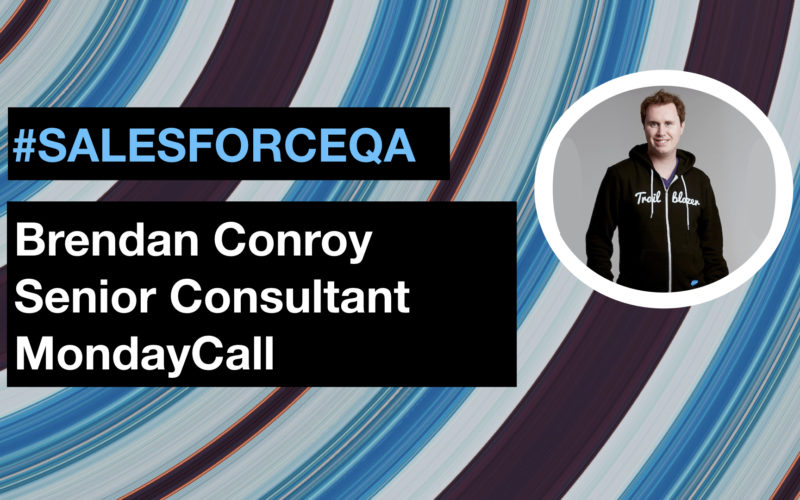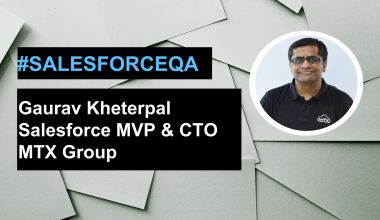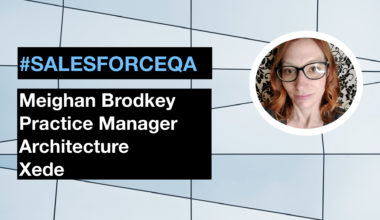In Third Republic’s Salesforce Q&A Series, we speak to industry leaders about what changes they have seen in the Salesforce universe, where they think it is heading, and what this means for those working in the ecosystem today.
Recently, we caught up with Brendan Conroy a Salesforce MVP and Senior Salesforce Consultant at MondayCall. Brendan explained to us how his career in Salesforce began and reveals his top tips, tricks and insights for those looking to develop their own career within the world of Salesforce.
Third Republic (TR): How did you begin your career in Salesforce? How did you get to where you are today?
Brendan Conroy (BC): I went for an interview for a Director of Sales position 7 years ago. Halfway through the interview, the Executive VP told me the job was filled, but wanted to put me forward for the role of Salesforce Administrator, despite having zero hands-on experience with Salesforce (though I had been an admin for other CRMs in the past).
When I was ultimately offered the job, I had just 4 days to learn as much as possible about Salesforce prior to starting my new role. This predated Trailhead, so I would watch hands-on training videos on YouTube from past Dreamforces to help me learn how to configure the tool.
After 4 months, I was promoted to Manager of Sales Operations, and after 10 months, I became a Salesforce MVP (1 of only 93 people worldwide at the time) and also earned my Admin Certification. My next role was for a Salesforce Consulting Partner called MondayCall, which is where I still work today.
I’d say I got where I am today because I was constantly learning about Salesforce. I genuinely developed a love for finding new functionality within the scope of the platform, so was excited to learn more and more about what could be done.
I also have to give a lot of credit to the Salesforce Answers Community. I was working in Professional Edition before it had Process Builder and Custom Profiles and the company I worked for wanted automation, which was not available. If it wasn’t for the Answers Community guiding me through setting up the more complex workarounds, I may have felt that Salesforce was limited, and thus may not have developed a passion for configuring the system.
TR: How has the Salesforce world changed during your time in it?
BC: When I started in Professional Edition, there was no Process Builder. If you wanted to have cross-object updates, you would have to go with custom code, which wasn’t available in Professional Edition as part of the out of the box package. So, in many ways, you would be stuck until you upgraded your system and brought in a developer who knows how to write APEX.
Now in many scenarios, you are able to use Process Builder (now in Professional Edition as well) in order to make more cross-object automation happen without custom code. There has also been the advent of Lightning Experience which has completely changed the Salesforce user experience.
TR: What do you enjoy most about working within the Salesforce ecosystem?
BC: I enjoy the sense of community that we have with Salesforce. There are exceptionally talented people from all over the world who help others to get the most out of the system in their free time (myself included). This can range from answering questions on the Community pages to helping college students to see the value in Salesforce as a potential career path.
It’s incredible to see so many people who are some of the best Salesforce Admins, Developers, and Architects in the world, devote their free time to helping others grow their careers and become successful in the ecosystem.
TR: What are the biggest challenges you have faced throughout your career and how did you overcome these?
BC: My biggest challenge was working in a Professional Edition instance with no prior hands-on Salesforce experience, while everyone at the company wanted to push the limitations of the system to extremes.
I had many sleepless nights where I was learning how to work around the limitations of the system, while also working full-time. I was able to overcome all of the pressure and ultimately build an instance that I am to this day, very proud of.
TR: What is the best advice you have been given that has helped you on your Salesforce journey?
BC: My best advice to those who are interested in Salesforce as a potential career would be to reach out to the Community. There are so many resources that are willing to donate their time in order to help others be successful.
I would also suggest using Trailhead as it is a platform that is put on by Salesforce itself in order to help people learn how to interact with the tool. Trailhead puts the instructions into a plain form of language that beginners would be able to understand. Salesforce as a platform is so expansive, it can seem overwhelming with how much could be done, so they make a lot of effort in order to make the process of learning the tool easy and fun.
Definitely get Admin Certified as well since that opens up MANY doors in terms of career opportunities.
TR: As someone who is heavily involved within the Salesforce community, how important do you think the Trailblazer community is to achieving success in the ecosystem?
BC: I think that the Community is pivotal to not only Salesforce’s success, but also everyday admins and developers. It is important for Salesforce to have people be happy and excited to use the tool. On the other side of that coin, it is important to have as many resources as possible available to end-customers in to make the most out of the tool. It is important to the general community because it can help shape how businesses operate day-to-day in ideally, the most effective way available.
If there were no Community, I think that many businesses would not be running as smoothly as they are today because there would not be an accessible platform of ideas, applications, and partners that could be utilised in order to make things easier for customers.
TR: Do you think Salesforce certifications are a good way to continue career development?
BC: I would suggest anyone who is interested in Salesforce as a potential career or even as just as a function of one’s job (e.g. Sales Managers, Service Managers, etc.) to get Admin Certified at the very least.
The certification makes you stand out from others who are interviewing for the same position. In my case, I had worked as an admin using Microsoft Dynamics and a couple of other home-grown CRM systems prior to working in Salesforce. If there were any other interviewees that had their Admin Certification, I probably would not have gone down this career path.
So, I would suggest investing the time in getting the Admin Cert in order to demonstrate that you understand the tool and general business processes, even if your end goal is not necessarily a career as an Admin/Developer. Certifications look good on your resume for other career paths as well.
TR: What emerging trends are you most excited about, and why?
BC: I am looking forward to seeing how Artificial Intelligence (e.g. Einstein) will change the landscape. Salesforce has so many features to it and I think that it makes sense to introduce AI in order to help end-users be more efficient at their jobs.
TR: Do you have any predictions for the future of Salesforce and where the ecosystem is headed?
BC: I suspect that we will be seeing a lot of enhancements when it comes to reporting in Salesforce. Native Salesforce reporting is good but limited to specific user cases, so I suspect that there will be enhancements to reporting.
TR: Finally, do you have any further comments or advice for those new to navigating the ever-changing world of Salesforce?
BC: My best advice would be to never become complacent and believe that you have learned all there is to know about Salesforce.
There is so much to learn about Salesforce, and with every release, there are new features to be explored and implemented in order to make the day-to-day processes more efficient.
I have colleagues and friends within the community that I can confidently say are some of the best in the world, but even they don’t know everything about the platform. I would suggest getting multiple certifications in different areas in order to gain a more solid grasp of the tool (as well as the fact that it looks great on a resume).
Another piece of advice I would give is to follow blogs detailing new release functionality. This way you are in the know for new functionality as it is released. Finally, staying connected within the Community, we are all in this together and as we continue to help each other we will continue to get as much value out of Salesforce as possible.


